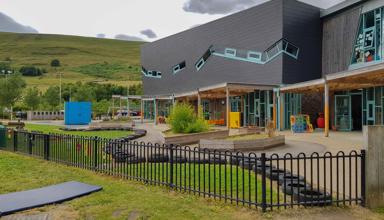Article by Michael Dauncey, National Assembly for Wales Research Service
This is the first of a series of articles this week exploring the detail of the Donaldson Review and what it means for the education of young people in Wales.
Professor Graham Donaldson’s report, ‘Successful Futures’, was published on 25 February. It follows a review of curriculum and assessment arrangements which lasted nearly a year and took evidence from over 700 people in Wales.
On the eve of the report’s publication, the Research Service blogged about the background to what Minister for Education and Skills, Huw Lewis, anticipated would be the ‘most significant curriculum reform Wales has ever seen’.
Amidst such expectations that his proposals would be radical and ground-breaking, Professor Donaldson’s report did not disappoint in that respect. Indeed, he concludes:
'Together, the current national curriculum and assessment arrangements no longer meet the needs of the children and young people of Wales. The case for fundamental change is powerful.'
Following the report’s publication, the Minister told AMs: ‘This is not some kind of tinkering exercise with the old national curriculum’. This marks the doing away with the national curriculum of 1988 and the rewriting from the ground floor up of an entirely new curriculum with a different philosophy behind it.’
Donaldson’s critique of the current position
The Donaldson Review finds that the need for change is not just due to shortcomings that have relatively recently been under the spotlight such as Wales' standing in PISA, comparative GCSE performance, and the challenging OECD review published last April. It is more long-term and fundamental than that. For a start, the world today is very different to when the national curriculum was introduced in 1988, not least because of the introduction and ubiquitous influence of the internet. Also thrown into the mix is devolution and the diverging approaches to education policy either side of Offa’s Dyke.
All of this leads Donaldson to report that ‘the curriculum has become overloaded, complicated and, in parts, outdated’. He adds that ‘assessment arrangements are not making the contribution they should to improving learning’ and that ‘the ability of schools and teachers to respond to rapidly changing needs is constrained’.
Professor Donaldson observes that a high degree of prescription and detail inhibits the agility and responsiveness of the curriculum. He comments:
‘At its most extreme, the mission of primary schools can almost be reduced to the teaching of literacy and numeracy and of secondary schools to preparation for qualifications.’
The shortcomings and need for change are certainly not unique to Wales and the evidence the Review received identified some ‘very real strengths’ upon which Wales can build, such as the Foundation Phase; the emphasis on literacy and numeracy; the commitment to equity and inclusion; the Welsh language; and the revised Welsh Baccalaureate.
Overview of Donaldson’s blueprint
Professor Donaldson identifies a false dichotomy between the use of traditional compartmentalised teaching content and an increasingly emerging approach towards expected outcomes of learning; a ‘subject against skill/competence’ debate which Donaldson says ‘creates unhelpful polarisation’.
For Donaldson, both elements are relevant and need to combine in a modern curriculum. Nevertheless, he describes international trends as moving away from ‘learning about…’ to ‘learning to…’. This echoes what Andreas Schleicher, the OECD’s leading educational voice and architect of PISA, said in June 2014: ‘The knowledge economy no longer pays you for what you know... it pays you for what you can do with what you know.’
The proposals in Successful Futures introduce a number of concepts and organising principles to a Curriculum for Wales. Some are new whilst others build on approaches already introduced.
Professor Donaldson started from a position of developing a vision of what a well-educated young person in Wales should look like, devising a set of 10 principles of curriculum design.
- He subsequently proposes four ‘Purposes of the curriculum’ which he recommends are laid down in primary legislation and are central to everything that goes on in schools.
- Instead of having relatively narrow and isolated subjects slotted into the timetable, Professor Donaldson proposes six ‘Areas of Learning and Experience’ as the single organising structure for an uninterrupted and seamless age 3-16 curriculum.
- The Review concurs with the priority the Welsh Government places on literacy and numeracy as core skills within the curriculum but adds a third – digital competence
- Professor Donaldson recommends digital competence should be treated with the same importance as literacy and numeracy.
- Literacy, numeracy and digital competence would therefore be the three ‘Cross-curriculum responsibilities’ that all teachers and areas of the curriculum would be expected to apply.
The second article in this series, published tomorrow, will explore in more detail what the Donaldson review proposes for curricula organisation and content.






